篇章翻译
- 格式:doc
- 大小:31.00 KB
- 文档页数:4

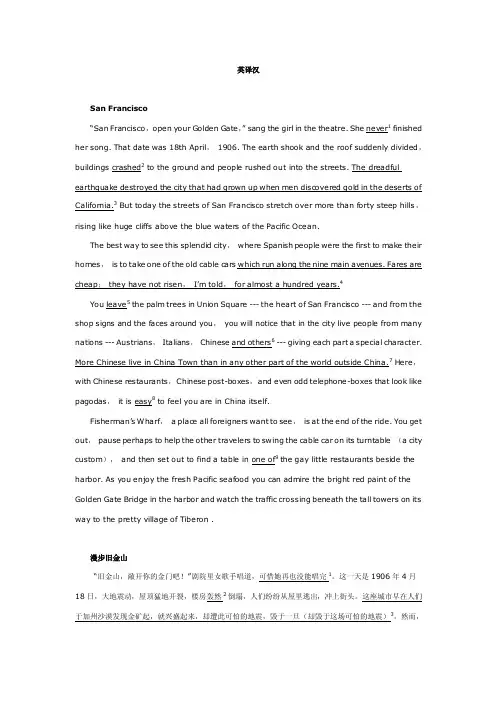
英译汉San Francisco“San Francisco, open your Golden Gate,” sang the girl in the theatre. She never1 finished her song. That date was 18th April,1906. The earth shook and the roof suddenly divided,buildings crashed2 to the ground and people rushed out into the streets. The dreadful earthquake destroyed the city that had grown up when men discovered gold in the deserts of California.3 But today the streets of San Francisco stretch over more than forty steep hills,rising like huge cliffs above the blue waters of the Pacific Ocean.The best way to see this splendid city,where Spanish people were the first to make their homes,is to take one of the old cable cars which run along the nine main avenues. Fares are cheap; they have not risen,I‟m told,for almost a hundred years.4You leave5 the palm trees in Union Square --- the heart of San Francisco --- and from the shop signs and the faces around you,you will notice that in the city live people from many nations --- Austrians,Italians,Chinese and others6 --- giving each part a special character. More Chinese live in China Town than in any other part of the world outside China.7 Here,with Chinese restaurants, Chinese post-boxes, and even odd telephone-boxes that look like pagodas,it is easy8 to feel you are in China itself.Fisherman‟s Wharf, a place all foreigners want to see,is at the end of the ride. You get out, pause perhaps to help the other travelers to swing the cable car on its turntable (a city custom),and then set out to find a table in one of9 the gay little restaurants beside the harbor. As you enjoy the fresh Pacific seafood you can admire the bright red paint of the Golden Gate Bridge in the harbor and watch the traffic crossing beneath the tall towers on its way to the pretty village of Tiberon .漫步旧金山“旧金山,敞开你的金门吧!”剧院里女歌手唱道,可惜她再也没能唱完1。
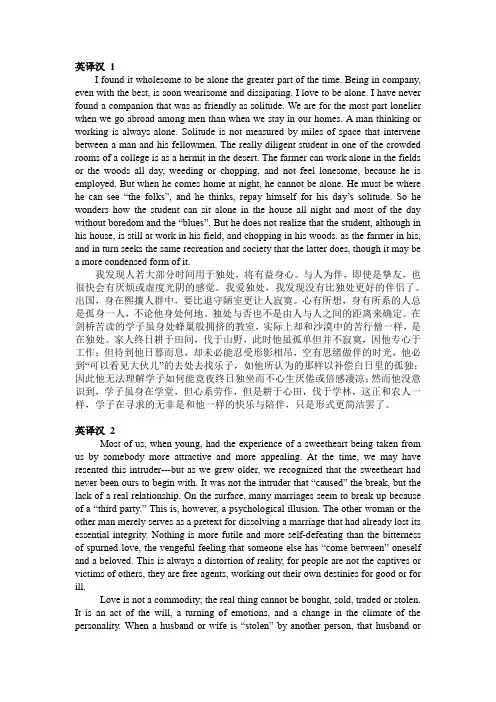
英译汉 1I found it wholesome to be alone the greater part of the time. Being in company, even with the best, is soon wearisome and dissipating. I love to be alone. I have never found a companion that was as friendly as solitude. We are for the most part lonelier when we go abroad among men than when we stay in our homes. A man thinking or working is always alone. Solitude is not measured by miles of space that intervene between a man and his fellowmen. The really diligent student in one of the crowded rooms of a college is as a hermit in the desert. The farmer can work alone in the fields or the woods all day, weeding or chopping, and not feel lonesome, because he is employed. But when he comes home at night, he cannot be alone. He must be where he can see “the folks”, and he thinks, repay himself for his day’s solitude. So he wonders how the student can sit alone in the house all night and most of the day without boredom and the “blues”. But he does not realize that the student, although in his house, is still at work in his field, and chopping in his woods. as the farmer in his, and in turn seeks the same recreation and society that the latter does, though it may be a more condensed form of it.我发现人若大部分时间用于独处,将有益身心。
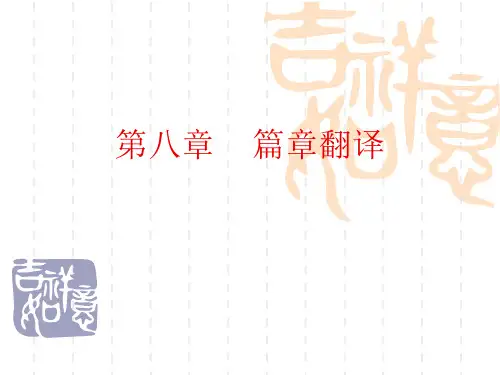
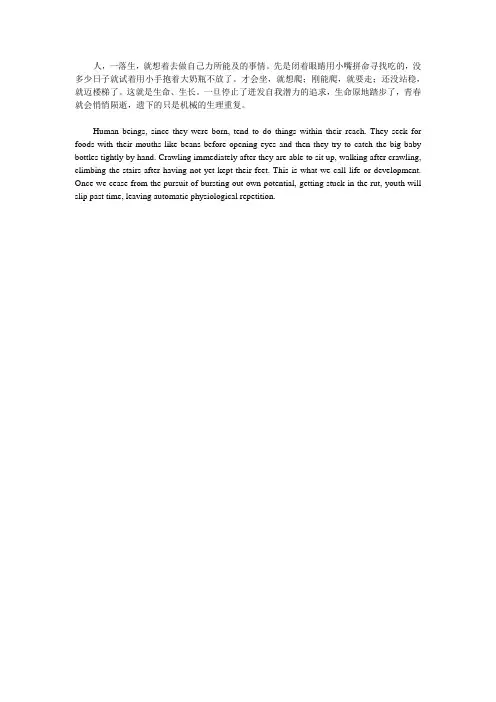
人,一落生,就想着去做自己力所能及的事情。
先是闭着眼睛用小嘴拼命寻找吃的,没多少日子就试着用小手抱着大奶瓶不放了。
才会坐,就想爬;刚能爬,就要走;还没站稳,就迈楼梯了。
这就是生命、生长。
一旦停止了迸发自我潜力的追求,生命原地踏步了,青春就会悄悄陨逝,遗下的只是机械的生理重复。
Human beings, since they were born, tend to do things within their reach. They seek for foods with their mouths like beans before opening eyes and then they try to catch the big baby bottles tightly by hand. Crawling immediately after they are able to sit up, walking after crawling, climbing the stairs after having not yet kept their feet. This is what we call life or development. Once we cease from the pursuit of bursting out own potential, getting stuck in the rut, youth will slip past time, leaving automatic physiological repetition.。
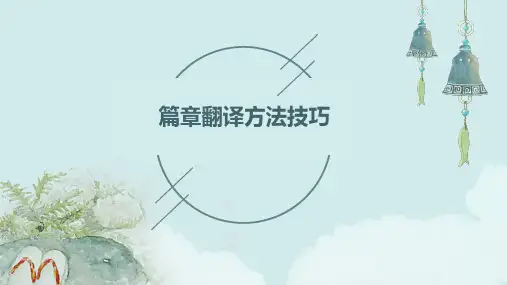
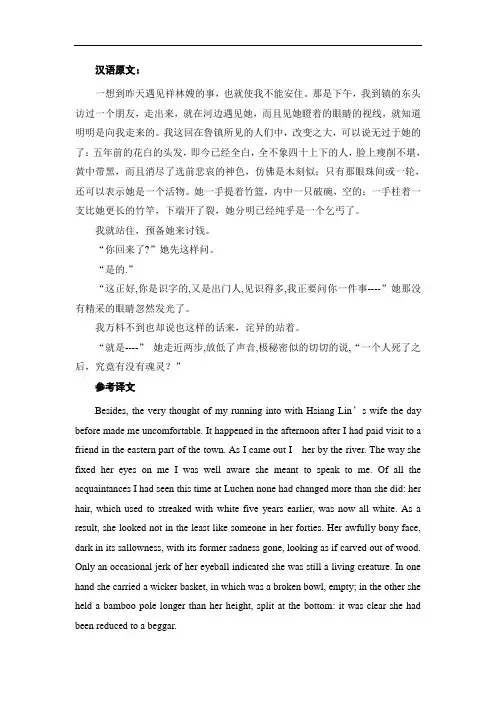
汉语原文:一想到昨天遇见祥林嫂的事,也就使我不能安住。
那是下午,我到镇的东头访过一个朋友,走出来,就在河边遇见她,而且见她瞪着的眼睛的视线,就知道明明是向我走来的。
我这回在鲁镇所见的人们中,改变之大,可以说无过于她的了:五年前的花白的头发,即今已经全白,全不象四十上下的人,脸上瘦削不堪,黄中带黑,而且消尽了选前悲哀的神色,仿佛是木刻似;只有那眼珠间或一轮,还可以表示她是一个活物。
她一手提着竹篮,内中一只破碗,空的;一手柱着一支比她更长的竹竿,下端开了裂,她分明已经纯乎是一个乞丐了。
我就站住,预备她来讨钱。
“你回来了?”她先这样问。
“是的.”“这正好,你是识字的,又是出门人,见识得多,我正要问你一件事----”她那没有精采的眼睛忽然发光了。
我万料不到也却说也这样的话来,诧异的站着。
“就是----”她走近两步,放低了声音,极秘密似的切切的说,“一个人死了之后,究竟有没有魂灵?”参考译文Besides, the very thought of my running into with Hsiang Lin’s wife the day before made me uncomfortable. It happened in the afternoon after I had paid visit to a friend in the eastern part of the town. As I came out I her by the river. The way she fixed her eyes on me I was well aware she meant to speak to me. Of all the acquaintances I had seen this time at Luchen none had changed more than she did: her hair, which used to streaked with white five years earlier, was now all white. As a result, she looked not in the least like someone in her forties. Her awfully bony face, dark in its sallowness, with its former sadness gone, looking as if carved out of wood. Only an occasional jerk of her eyeball indicated she was still a living creature. In one hand she carried a wicker basket, in which was a broken bowl, empty; in the other she held a bamboo pole longer than her height, split at the bottom: it was clear she had been reduced to a beggar.I stood still, waiting for her to approach me and beg for money.“you have come back?”she asked me first.“yes.”“that is good. You are a scholar, and have traveled too and have seen much of the world. I just want to ask you something.”Her lusterless/blank/dull eyes suddenly lit up.I never expected she would talk to me in this way. So I stood there in bewilderment.“My question is.”She drew/took two paces nearer, and whispered very confidentially: “After a person dies, will he turn into a ghost or not?”汉语原文:故院原为紫禁城,已有550年历史。
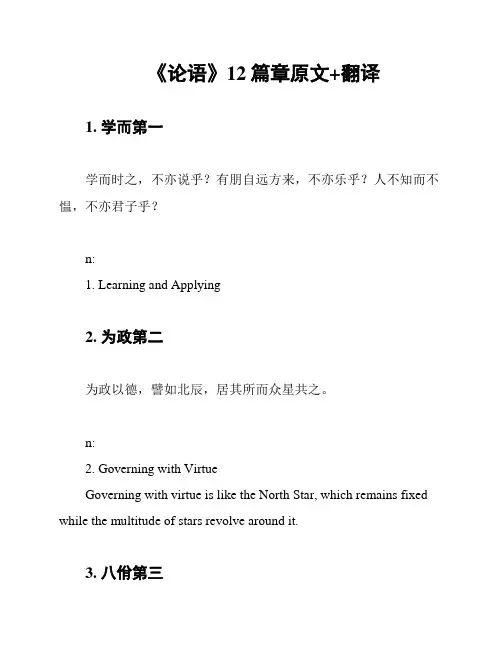
《论语》12篇章原文+翻译1. 学而第一学而时之,不亦说乎?有朋自远方来,不亦乐乎?人不知而不愠,不亦君子乎?n:1. Learning and Applying2. 为政第二为政以德,譬如北辰,居其所而众星共之。
n:2. Governing with VirtueGoverning with virtue is like the North Star, which remains fixed while the multitude of stars revolve around it.3. 八佾第三子曰:“八佾舞于庭,是可忍也,孰不可忍也?”n:3. The Eight DancesConfucius said, "___. But who is not tolerable?"4. 里仁第四子曰:“里仁为美。
择不处仁,焉得知?”n:4. ___ FamilyConfucius said, "Being kind within the family is beautiful. If one is unable to choose kindness, how can one understand it?"5. 公冶长第五子谓公冶长:“可妻也,虽在距之千里,可求也;可与也,虽在距之千里,可迎也。
”n:5. Gongye Chang6. 雍也第六子曰:“雍也可使南面。
”n:6. Yong YeConfucius said, "Yong Ye could be appointed as the one who ___."7. 颜渊第七子曰:“颜渊,季路可使南行。
”子路曰:“治!如之何?”子曰:“可与言而不可与行也。
”子路由此度名。
n:7. Yan YuanConfucius said, "Yan Yuan and Ji Lu could be ___ state." Zi Lu said, "If they were to be appointed, what should be done next?" Confucius said, "They can be taught what should be said, but not what should be done." After this, Zi Lu evaluated people according to their words.8. 季氏第八季氏将伐颛臾,冉有、季路见于孔子曰:“季氏将有事于颛臾。
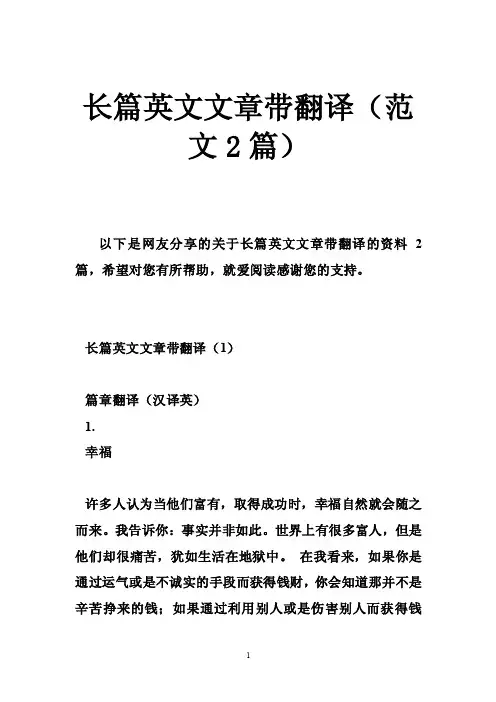
长篇英文文章带翻译(范文2篇)以下是网友分享的关于长篇英文文章带翻译的资料2篇,希望对您有所帮助,就爱阅读感谢您的支持。
长篇英文文章带翻译(1)篇章翻译(汉译英)1.幸福许多人认为当他们富有,取得成功时,幸福自然就会随之而来。
我告诉你:事实并非如此。
世界上有很多富人,但是他们却很痛苦,犹如生活在地狱中。
在我看来,如果你是通过运气或是不诚实的手段而获得钱财,你会知道那并不是辛苦挣来的钱;如果通过利用别人或是伤害别人而获得钱财,你不会因此高兴。
你会认为自己是个卑鄙的人。
长期的幸福是建立在诚实,有成果的工作,贡献和自尊的基石上的。
幸福并不是终点,而是种过程。
那是一个持续地通过诚实,有成果的工作为他人奉献的过程,这样做也会让你感到自己是一个有用的且有价值的人。
如果你等待某些事情的发生或依靠生活的外部环境来让你自己感到幸福,你总也不会感到满足。
总会有些事与你失之交臂On Happiness1Many people think that when they become rich and successful ,happiness will naturally follow.Let me tell you that nothing is further from the truth.The world is full of very rich people who are miserable as if they were living in hell.T o my mind,If you obtain wealth through luck or dishonest means,you will know that it is ill earned money .If you get your money by taking advantage of others or by hurting others, you will not be happy with it.You will think you are a base person. Long-term happiness is based on honesty,productive work,contribution ,and self-esteem.Happiness is not an end; it is a process.It is a continuous process of honest ,productive work which makes a real contribution to others and makes you feel you are a useful, worthy person. If you wait for certain things to happen and depend on external circumstances of life to make you happy, you will always feel unfulfilled. There will always be something missing.。
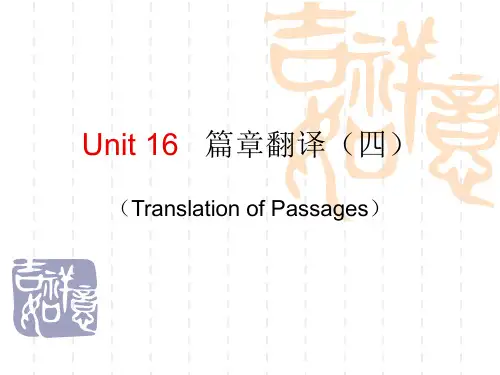
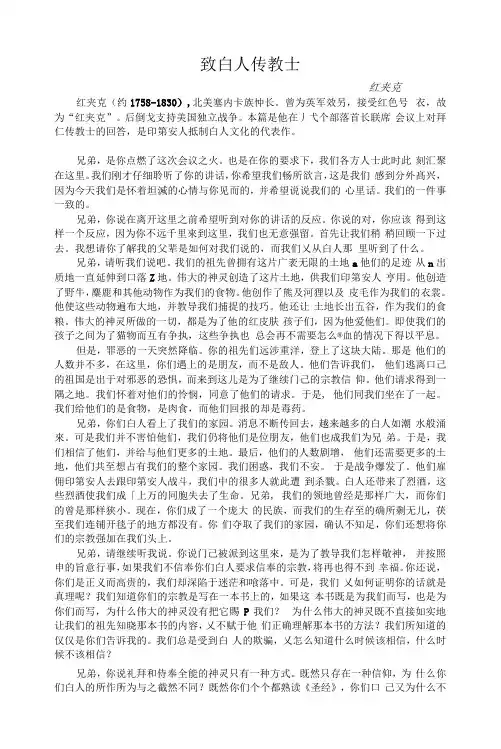
致白人传教士红夹克红夹克(约1758-1830),北美塞内卡族忡长。
曾为英军效另,接受红色号衣,故为“红夹克”。
后倒戈支持美国独立战争。
本篇是他在丿弋个部落首长联席会议上对拜仁传教士的回答,是印第安人抵制白人文化的代表作。
兄弟,是你点燃了这次会议之火。
也是在你的要求下,我们各方人士此时此刻汇聚在这里。
我们刚才仔细聆听了你的讲话,你希望我们畅所欲言,这是我们感到分外髙兴,因为今天我们是怀着坦滅的心情与你见而的,并希望说说我们的心里话。
我们的一件事一致的。
兄弟,你说在离开这里之前希望听到对你的讲话的反应。
你说的对,你应该得到这样一个反应,因为你不远千里來到这里,我们也无意强留。
首先让我们稍稍回顾一下过去。
我想请你了解我的父辈是如何对我们说的,而我们乂从白人那里听到了什么。
兄弟,请听我们说吧。
我们的祖先曾拥有这片广袤无限的土地a他们的足迹从n出质地一直延伸到口落Z地。
伟大的神灵创造了这片土地,供我们印第安人亨用。
他创造了野牛,麋鹿和其他动物作为我们的食物。
他创作了熊及河狸以及皮毛作为我们的衣裳。
他使这些动物遍布大地,并教导我们捕捉的技巧。
他还让土地长出五谷,作为我们的食粮。
伟大的神灵所做的一切,都是为了他的红皮肤孩子们,因为他爱他们。
即使我们的孩子之间为了猫物而互有争执,这些争执也总会再不需要怎么®血的情况下得以平息。
但是,罪恶的一天突然降临。
你的祖先们远涉重洋,登上了这块大陆。
那是他们的人数并不多,在这里,你们遇上的是朋友,而不是敌人。
他们告诉我们,他们逃离口己的祖国是出于对邪恶的恐惧,而来到这儿是为了继续门己的宗教信仰。
他们请求得到一隅之地。
我们怀着对他们的怜悯,同意了他们的请求。
于是, 他们同我们坐在了一起。
我们给他们的是食物,是肉食,而他们回报的却是毒药。
兄弟,你们白人看上了我们的家园。
消息不断传回去,越来越多的白人如潮水般涌來。
可是我们并不害怕他们,我们仍将他们是位朋友,他们也成我们为兄弟。
《论语》12篇章原文+翻译.txt 论语12篇章原文+翻译1. 学而篇原文:子曰:“学而时之,不亦说乎?有朋自远方来,不亦乐乎?人不知而不愠,不亦君子乎?”翻译:孔子说:“研究并且适时地复,岂不令人愉快?有朋友从远方来,岂不令人快乐?人家不知道我,我也不生气,难道不是君子吗?”2. 为政篇原文:子曰:“为政以德,譬如北辰,居其位置而众星共之。
”翻译:孔子说:“治理国家要以德行为基础,就像北极星一样,它虽然独立居住在自己的位置上,但其他星辰都围绕它而转。
”3. 八佾篇原文:子曰:“割鸡焉用牛刀?”翻译:孔子说:“宰杀一只鸡,何必使用牛刀呢?”4. 学而第一篇原文:子曰:“三人行,必有我师焉。
择其善者而从之,其不善者而改之。
”翻译:孔子说:“三个人一起行走,其中必定有我可以向他们研究的人。
选择他们的优点并追随,对于他们的缺点则加以改正。
”5. 子罕第四篇原文:子谓子贡曰:“女与回也孰愈?”对曰:“赐也何敢望回!回也闻一以知十,赐也闻一以知二。
”孔子曰:“弗如也!吾与女弗如也!”翻译:孔子对子贡说:“你和回谁更优秀?”子贡回答:“我怎么敢和回相比呢?回听到一件事就能理解十件事,而我只能理解两件。
”孔子说:“你们都不如我啊!”6. 为政篇第九篇原文:子曰:“君子不器。
”翻译:孔子说:“君子不只是一个。
”7. 为政篇第十九篇原文:子曰:“君子周而不比,小人比而不周。
”翻译:孔子说:“君子的思考是全面而不局限于个人,小人的思考是片面而忽略整体。
”8. 为政篇第二十二篇原文:子曰:“君子病无能也,小人病无道也。
”翻译:孔子说:“君子的问题是能力不足,小人的问题是道德修养不好。
”9. 子罕第二十三篇原文:子谓子产:“有君子之道四焉:其行己也恭,其事上也敬,其养民也惠,其使民也义。
”翻译:孔子对子产说:“具备君子的品质有四个:自己的行为要谦恭,对上级要敬奉,对待民众要慈爱,任用民众要公正。
”10. 八佾篇第二十五篇原文:子曰:“不患无位,患所以立;不患莫己知,求为可知也。
practitioner n. 习艺者,实习者;从业者(尤指医师)杰奎琳·费利斯·德·阿尔马尼亚(约1322年)(的生平经历)充分体现了人们行医妇女的怀疑。
她出生在佛罗伦萨的一个犹太家庭,后来搬到巴黎,在那里做医生并做手术。
1322年,她因非法执业而受审。
尽管法庭听取了关于她作为一名医生的能力的证词(证明),但她还是被禁止行医。
詹姆斯·巴里(约1789-1865年)出生在爱尔兰的玛格丽特·布克利,但她打扮成男人,被爱丁堡大学录取学习医学。
1813年,她获得了一名外科医生的资格,然后加入了英国军队,在海外服役。
巴里于1859年退休,她以男性身份从事医疗职业生涯生活和工作。
谭云县(1461-1554)是一名中国医生,从祖父母那里学习技能。
当时的中国妇女不能为医生的学徒(学徒期)。
然而,谭美通过了正式考试。
谭治疗来自各行各业的女性。
1511年,谭写了一本书,《一个女医生的语录》,描述了她作为一名医生的生活。
丽贝卡·李·克拉姆普勒(1831-1895)做了8年的护士,1860年在波士顿的医学院学习。
四年后,她成为了第一个获得医学学位的非裔美国女性。
1865年,她搬到了弗吉尼亚,在那里她为被释放的奴隶提供医疗服务。
1.杰奎琳和詹姆斯有什么共同之处?A.做教学工作。
B.被聘为医生。
C. 进行手术。
D. 被禁止用药。
2.谭云仙与其他执业者有何不同?A.她写了一本书。
B.她经历了种种考验。
C. 她当过牙医。
D. 她接受过正规的教育。
3. 谁是第一个拥有医学学位的非裔美国人?A. 杰奎琳费利斯德阿尔马尼亚。
B. 谭云贤。
C. 詹姆斯巴里。
D. 丽贝卡李克拉姆普勒。
B住在爱荷华州,试图成为一名专攻风景(风景)的摄影师是一个相当大的挑战,主要是因为这个玉米州缺乏地理差异。
(Iowa玉米产量位居第一)尽管中西部的景观往往非常相似,无论是农田还是高速公路,有时我会在丘陵或湖泊中发现独特的特征。
篇章翻译---英译汉We sometimes fall in with person who have seen much of the world, and of the man who, in their day, have played a conspicuous part in it, but who generalized nothing,and have no observation, in the true sense of the world. They abound in information in detail ,curious and entertaining, about men and things, and, having lived under the influence of no very clear or settled principles, religious or political, they speak of every one and everything, only as so many phenomena, which are complete in themselves, and lead to nothing, not discussing any truth, or instructing the hearer, but simple talking. No one would say that these persons, well informed as they are, had attained to any great culture or intellect or to philosophy.译文:我们有时邂逅一些熟悉世故的人,和一些曾经见过许多在其全盛时代,叱咤风云,世界安危所系的有名人物的人,但是他们却不能归纳出一点什么来,也毫无真正的观察力。
近代的上海,十里洋场,// 自开埠(读“布”)以来,固然有许多辛酸的不平等的血泪史,固然有许多污泥浊水,这里被成为是“冒险家的乐园”,// 这里有鸦片,有荡妇,有赌棍,// 使人纸醉金迷,乃至使人堕落。
// 可是,上海这座现代大城市却更有它的另一面,// 它有活力、它聪慧、革新、进取,// 它敢于担风险,有竞争意识及机制(?!),// 这种城市意识(?!)或风格,使人奋发,跟上时代,走向进步。
Shanghai in modern times was a metropolis crowded with foreign adventurers .// After the port city opened up , it witnessed a history of blood and tears filled with bitterness, inequality, filth and mire, well-known as the “Parasise of Adventuers”for its rampant opium, harlots and gamesters, which induced people to indulge in luxury and even degeneracy. //There was, however, another facet to modern Shanghai noted for its vigor, intelligence, creations and enterprise with a spirit ready for running risks, which formed an awareness of its own and the mechanism of competition. //The city, with this awareness or style, inspired its people to keep up with the times and make progress.“我叫阿毛,没有应。
篇章翻译Confessions of a Miseducated Man 英汉对照These notes are in the nature of a confession. It is the confessionof a miseducated man.下⾯的这段⽂字是⼀篇⾃⽩,是⼀个受到错误教育的⼈的⾃⽩。
I have become most aware of my lack of a proper education wheneverI have had the chance to put it to the test. The test is a simpleone: am I prepared to live in and comprehend a world in which thereare 3 billion people? Not the world as it was in 1850 or 1900, forwhich my education might have been adequate; but the world today.And the best place to apply that test is outside the country -especially Asia orAfrica.每当我有机会检验我所受到的教育,我都会异常清醒地认识到它的不当之处。
测验很简单:在这个有三⼗多亿⼈⼝的世界上⽣存并理解它,我真的准备好了吗?是今天这个世界,⽽不是1850年或1900年的那个世界;我受到的教育对那时的世界可能已经⾜够。
实⾏这项测验的最佳地点是在国外——尤其是在亚洲或⾮洲。
Not that my education was a complete failure. It prepared mesuperbly for a bird's-eye view of the world. It taught me how torecognize easily and instantly the things that differentiate oneplace or one people from another. Geography had instructed me indifferences of terrain, resources, and productivity. Comparativeculture had instructed me in the differences of background andgroup interests. Anthropology had instructed me in the differencesof facial bone structure, skin pigmentation, and general physicalaspect. In short, my education protected me against surprise. I wasnot surprised at the fact that some people lived in mud huts andothers in bamboo cottages on stilts; or that some used peat forfuel and others dung; or that some enjoyed music with a five-notescale and others with twelve; or that some people were vegetarianby religion and others by preference.我的意思不是说我所受的教育彻底的失败了。
第六章篇章的翻译
课堂讲解一:享受
1.美国有一位80多岁的老人,花费了17年的时间,缝制了一床拼花棉被。
这床棉被在美国的民间艺术展中,引起观赏者极大兴趣。
有一位记者采访老人时问:“用17年缝制一床棉被,你不觉得辛苦、寂寞吗?”老人回答说:“不,一点也不。
这17年缝制一床棉被对我来说不是受苦,而是一种享受。
”
作家林斤澜写过一篇短文,说作家孙犁曾有一个出国机会,总人垂涎欲滴,但他轻易就放弃了,原因竟是:他不会打领带。
其实,不会打领带只是借口,关键是孙犁没有把出国当作享受。
孙犁的享受是什么呢?在他写的《书衣文录》里,有这样的句子:“东日透窗,光明在案。
裁纸装书,甚适。
”
人生的享受又许多中,然而,现在任么的享受变得越来越趋同了。
几乎每个人都认为,住豪宅开名车、大把花钱、吃山珍海味是享受。
而很少有人留意骑车、散步、种花养鸟、亲朋相聚、与爱人相濡以沫……都是人生的享受。
其实,享受和金钱无关,然而认识享受,全看我们又怎样的情怀。
课堂讲解二:最珍贵的废书
一天,收拾屋子,找出两本布满尘土的小学课本。
女友说还不扔了?我抚摸着书半晌没说话。
书是我上高中时妈妈为我买的。
妈妈是个一字不识的苗家妇女。
家乡有种风俗,一个女人在去世时,口里必须含银(或金)才能入土为安。
所以在贫困人家,攒钱置办一件小小的银饰便成了家庭生活的重要内容。
那一年,妈妈起早摸黑喂了两口猪,终于置了一对银手镯。
在临近高考的那段日子,妈妈时常进城给我送些吃的。
她知道我复习忙,每次都是匆匆来匆匆去。
有一天,妈妈去了不久却又回来,拉我到僻静处:“孩子,我替你买了两本考大学的书。
”
“什么!”我心里咯噔一下。
常听人说学校外面时常有人用假书、假资料骗那些来自山区一字不识的家长。
“人家说,只要用这书,考大学包中。
”
“哪来的钱?”
“镯子换的。
”
我抢过书,撕去包装,一阵巨大的绝望顿时袭上心头:两本小学课本竟然就骗走了妈妈的镯子!
“孩子,行吧?”
望着满怀希望的母亲,我强压下泪水和屈辱,“行,妈,行的!”
后来我考上了大学,妈妈高兴极了,说是两只镯子花得值。
她甚至想找卖给她书的人道谢!
“你妈后来知道真相了吗?”女友问。
“没有。
我永远都不会让她知道。
”
补充内容(两课时):英语专业八级考试例讲(汉译英)
TEM(2002)
大自然对人的恩赐,无论贫富,一律平等.所以人们对于大自然,全部一致并深深地依赖着.尤其在乡间,上千年来人们一致以不变的方式生活着.种植庄稼和葡萄,酿酒和饮酒,喂牛和挤奶,锄草和栽花;在周末去教堂祈祷和做礼拜,在节日岛广场拉琴,跳舞和唱歌;往日的田园依旧是今日的温馨家园.这样,每个地方都有自己的传说,风俗夜酒衍传了下来.
TEM(2003)
得病以前,我受父母宠爱,栽家中横行霸道,一旦隔离,拘禁栽花园山坡上以幢小房子里,我顿感打入冷宫,十分郁
郁不得志耆老.一个春天得傍晚,园中百花怒放,父母在园中设宴,一时宾客云集,笑语四溢.我在山坡的小屋里,悄悄掀起窗帘,窥见园中大千世界,一片繁华,自己的哥姐,堂表弟兄,也穿插其间,个个喜气洋洋.一霎时,一阵被人摒弃,为世所遗的悲愤兜上心头,禁不住痛哭起来.
TEM(2006)
中国民族自古以来从不把人看作高于一切,在哲学文艺方面的表现都反映锄人在自然界中与万物占着一个比较较为恰当的地位,而非绝对统治万物的主宰.因此我们的苦命,基本上比西方人为少为小;因为苦闷的强弱原是随欲望于野心的大小而转移的.农业社会的人比工业社会的人享受差得多,因此欲望也小得多.况中国古代素来以不滞于物,不为物役为最主要的人生哲学.并非我们没有守财奴,但比起莫利哀与巴尔扎克笔下的守财奴与野心家来,就小巫见大巫了.中国民族多数是性情中正和平、淡泊、朴实,比西方人容易满足。